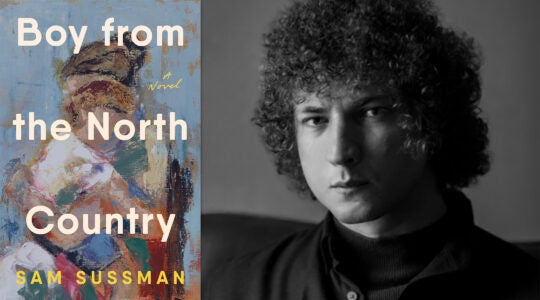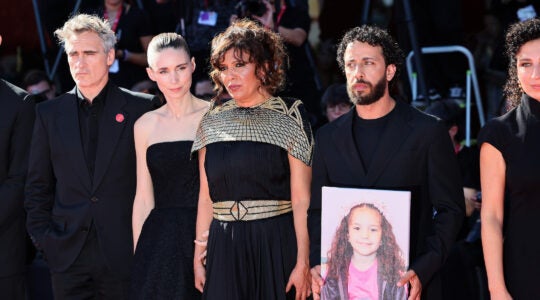NEW YORK (JTA) — One night back in 1985, businessman Bruce Slovin was walking home from a corporate board meeting with a lawyer named Joe Greenberger when Greenberger asked him about his involvement in the Jewish world.
Slovin responded that he wasn’t at all active, so Greenberger invited him to attend the next board meeting of YIVO, the research institute in New York on East European Jewry and Yiddish.
Slovin, who had recently lost his grandfather and father, attended the meeting and found himself spellbound.
“There was sitting my grandfather and father, who had just died — another Shlomo and a Yaakov,” he said, invoking his father and grandfather’s names.
“They were smoking with cigarettes like this” — he said, making an overhand gesture with his own Parliament cigarette. “They would drink schnapps after they had the board meeting. They were great storytellers. My father and grandfather were alive again.”
The flash of nostalgia set Slovin, a Brooklyn native, on a course that led to his joining the board of the YIVO Institute for Jewish Research and ultimately becoming the founding chairman of the Center for Jewish History in New York.
The center is a partnership of five historical organizations: the American Jewish Historical Society, the American Sephardi Federation, the Leo Baeck Institute, the Yeshiva University Museum and YIVO. It features the largest repository of Jewish historical artifacts in the Diaspora, with an impressive building near New York’s Union Square that contains 100 million artifacts and documents, and a library with half a million volumes.
More than 250 people gathered May 10 at a dinner to fete Slovin, 75, as he steps down as the center’s chairman.
The gala, held on the occasion of the center’s 10th anniversary, served as an opportunity to recognize the New Yorker’s lead role in the long, bumpy road to creating the center and putting it on sound financial footing.
An event that raised $1.2 million for the center also featured the unveiling of a stone plaque engraved with Slovin’s profile that will hang in its lobby.
“There would be no Center for Jewish History without Bruce Slovin,” Michael Glickman, the center’s chief operating officer, told JTA.
After attending that first board meeting in 1985, Slovin was shocked to discover that the documents in the YIVO archives were not well preserved.
“I saw these records degrading. There was no proper humidification, the warehouses were a mess,” he said. “We were broke all the time; that’s all we could afford.”
Slovin, then the president of MacAndrews & Forbes Holdings and of the Revlon Group, was soon installed as YIVO chairman. He began to push the often-resistant board to sell the building and move to a lower-priced area.
Greenberger, however, was thinking bigger: He suggested bringing in other Jewish organizations.
The idea for the Center for Jewish History was born.
Between 1994 and 2000, when the center opened to the public, Slovin had raised $67 million using strategies that many at the gala joked were “unique.”
“He came to my office and asked me for money,” Simon Ziff, whose name now adorns the center’s Ackman & Ziff Family Genealogical Institute, told JTA at the gala. “I’m not a big giver, but Bruce is tireless.”
“I was astounded by the amount of time he put into this venture,” added Ted Mirvis, co-chair of the board of trustees for Yeshiva University Museum and secretary of the center’s board of directors, at the gala.
Slovin, who received a bachelor’s degree in economics from Cornell University and a law degree from Harvard, had honed his ability to raise money as a child. He was so adept that eventually he was banned from a fundraising competition for planting trees in British Mandate Palestine because he won so often.
Despite his prowess, the center faced consistent financial difficulties. In 2007 there was controversy over a proposed takeover by New York University of the financially troubled center. More recently, the Forward reported that Slovin was asked to step down from the YIVO board amid a string of painful layoffs.
Slovin described the story as untrue and “dead wrong.”
The center also faced accusations of mismanagement and detractors who questioned its very raison d’etre.
Among the critics was Jonathan Sarna, the Joseph H. and Belle R. Braun Professor of American Jewish History at Brandeis University and a prominent historian of American Judaism. Sarna repeatedly called for the center to be dissolved into its constituent parts.
But Sarna, among others, reconsidered his position with the announcement in January that the center had raised more than $30 million in 15 months from 22 donors — allowing it to wipe out its debts for the first time.
In February, Sarna called the center one of the most important Jewish archives in the world.
“Now that it’s financially viable,” he said, “it’s perfectly clear that it has found a place.”
Slovin points to the academic’s endorsement as a benchmark for the center.
It is this relative peace from debtors and critics that has allowed “everyone to relax a little bit,” he said, and made him comfortable with stepping down as chairman.
The chair will pass to William Ackman and Joseph Steinberg, who together led the recent capital campaign and were its largest donors.
While he will remain on the center’s board and as YIVO’s chairman, Slovin plans to focus on his business, the real estate and financial holdings company 1 Eleven Associates, as well as bringing in more scholars to the center and writing its history.
“Bruce doesn’t claim to be a scholar,” Mirvis said, “but he understands the needs of scholars.”
Hearing this, Slovin smiles wryly.
“I’m just smart enough to understand the need to have a history,” he said. “As a people as valuable to human kind as the Jewish people are, it seemed dead wrong not to have as much of history as we can save — and we have tons more work to do.”
JTA has documented Jewish history in real-time for over a century. Keep our journalism strong by joining us in supporting independent, award-winning reporting.





